|
|
|
Sort Order |
|
|
|
Items / Page
|
|
|
|
|
|
|
| Srl | Item |
| 1 |
ID:
177008
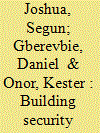

|
|
|
|
|
| Summary/Abstract |
Since independence on October 1, 1960, Nigeria has been a victim, at one time or the other, of intra-ethnic, inter-ethnic, religious, and communal conflicts which have undermined the human security of her citizens. Nigeria’s corporate existence had also been threatened by 3 years (1967–1970) civil war which impacted negatively on the well-being of its people. In addition, the inability of the Nigerian Police to cope with the magnitude of the surge of violence in recent years has brought about the idea of involving the military, a core component of traditional security apparatus to deal with internal insecurity. This article is anchored on human security paradigm with reliance on secondary data to analyze the operations of the Nigerian Military in counterviolence campaigns between 1999 and 2017. This article points out that the involvement of the military in internal security has worsened the problem of insecurity due to the military’s unprofessional approach and, at times, deliberate targeting the civilian populace which it is supposed to protect. It, therefore, recommends among others, the need for the Federal Government of Nigeria to urgently review the role of the armed forces in addressing internal security situations in a way that will bring about respect for the rule of engagement in internal security operations and adherence to global best practices.
|
|
|
|
|
|
|
|
|
|
|
|
|
|
|
|
| 2 |
ID:
177004
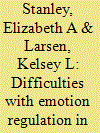

|
|
|
|
|
| Summary/Abstract |
The ability to regulate negative emotions is especially necessary for service members in the contemporary U.S. armed forces, since they routinely face situations that elicit negative emotions while executing their professional roles. Yet difficulties with regulating emotions, which are associated with stress and mood disorders, suicidality, and impairments in work performance, remain prevalent across this group. This article surveys research in five domains—recruitment and selection effects, military cultural pressures and coping strategies, training, common chronic stressors, and the contemporary operational environment—to highlight structural contributors to the heavy stress loads that U.S. service members often bear, which may contribute to their difficulty with emotion regulation (ER). It concludes with several recommendations that the military could implement to mitigate service members’ stress loads and facilitate ER. Enhancing their ER skills may offer a long-term strategy to improve their resilience and performance.
|
|
|
|
|
|
|
|
|
|
|
|
|
|
|
|
| 3 |
ID:
177003
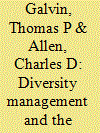

|
|
|
|
|
| Summary/Abstract |
The U.S. Military institutionalized diversity management to ensure equality of treatment and opportunity for members while eliminating discrimination in all its forms. But progress toward diversity goals has been inconsistent. For example, the U.S. Military’s implementation of the repeal of the Don’t Ask, Don’t Tell law was less successful in integrating transgender soldiers. Meanwhile, recent sexual harassment scandals show that progress is similarly fleeting in gender relations. In this article, we argue that while the aims of diversity management are important, they need an accompanying vision of what the future looks like after achieving those aims. The postdiversity vision includes more than the elimination of discriminatory behaviors; it describes what the defense establishment looks like and how it functions when diversity management is no longer required. Expressing this vision allows for more reliable and durable measures of performance and effectiveness of inclusion efforts.
|
|
|
|
|
|
|
|
|
|
|
|
|
|
|
|
| 4 |
ID:
177002
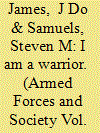

|
|
|
|
|
| Summary/Abstract |
This qualitative study examines how cadets at the U.S. Air Force Academy make sense of their experiences, form attitudes and beliefs, construct identities, and how a vocal minority of men create and perpetuate a biased gender norm. Despite an institutional intention of egalitarianism, cadets construct a highly masculinized culture. Focus group and interview analyses show how cadets perpetuate the military masculine-warrior narrative in sensemaking and the construction of gender differences. We argue that the narratives become an acceptable way to express gender biases, overriding the actual reason for the existence of fitness testing. We conclude by addressing the contradiction between policies promoting the inclusion of women in the military and the sexism described above. Acknowledging the lived experience of military personnel would allow for better perceptions of gender equality and suggests potential directions for policy, practice, and future research.
|
|
|
|
|
|
|
|
|
|
|
|
|
|
|
|
| 5 |
ID:
177006
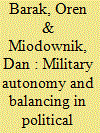

|
|
|
|
|
| Summary/Abstract |
This article argues that autonomous militaries can play a balancing role during major internal political crises. However, when militaries’ autonomy is curtailed by political leaders before the crisis, militaries cannot maintain the political balance between rulers and opponents, thereby increasing the risk of armed conflict. The article first explains the main concepts relevant to the discussion (autonomy, political crisis, balancing role), exploring their possible interlinkages and presenting several hypotheses. Subsequently, it discusses four relevant cases from the Middle East before and during the Arab revolts of 2010–2011: Egypt in 2011 and Lebanon in 1958, which demonstrate the balancing capacities of autonomous militaries during major political crises, and Lebanon in 1975 and Syria in 2011, which reveal that nonautonomous militaries cannot play a balancing role in such circumstances. The article concludes with several observations regarding the military’s balancing role during major internal political crises in divided and homogenous states.
|
|
|
|
|
|
|
|
|
|
|
|
|
|
|
|
| 6 |
ID:
177009


|
|
|
|
|
| Summary/Abstract |
With four successful and three failed coups in less than 60 years, the Turkish military is one of the most interventionist armed forces in the global south. Despite this record, few scholars have analyzed systematically how the military’s political role changed over time. To address this gap, this article examines the evolution of civil–military relations (CMR) in Turkey throughout the 1960s and 1970s. Based on a historical analysis, this article offers a revisionist account for the extant Turkish scholarship and also contributes to the broader literature on CMR. It argues that the military’s guardian status was not clearly defined and that the officer corps differed strongly on major political issues throughout the Cold War. This article also demonstrates that the officer corps was divided into opposite ideological factions and political agendas and enjoyed varying levels of political influence due to frequent purges and conjectural changes.
|
|
|
|
|
|
|
|
|
|
|
|
|
|
|
|
| 7 |
ID:
177007
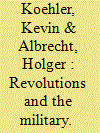

|
|
|
|
|
| Summary/Abstract |
This article presents a systematic analysis of military coups following popular mass uprisings in nondemocratic regimes, conceptualized as endgame coups. Drawing on our original, medium-n data set of revolutionary situations, we find that such endgame coups form a distinct type of military intervention in politics. Compared to regular coups, episodes of popular mass contestation prompt conservative interventions in politics of the military’s leadership aimed at preserving the regime’s authoritarian infrastructure. A systematic test of factors characterizing postcoup political trajectories is based on Cox proportional hazard models and provides empirical evidence in contrast to the widely held notion of “democratic coups.” Our findings reveal that endgame coups are conservative rollback coups, executed by military leaderships, that result in continued political instability and illiberal politics.
|
|
|
|
|
|
|
|
|
|
|
|
|
|
|
|
| 8 |
ID:
177005
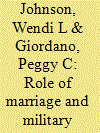

|
|
|
|
|
| Summary/Abstract |
We build on prior research examining military involvement and criminal involvement by investigating the importance of acquiring the more complete “respectability package” that includes marriage as well as military experience and variations among White and Black respondents. Using data from Waves I and IV of the National Longitudinal Study of Adolescent to Adult Health (Add Health; n = 5,801), analyses use logistic regression models to assess associations of military service, marriage, and race with odds of reoffending among White and Black young adults who reported offending at Wave I. Military involvement was associated with lower odds of offending for Black respondents only, while marriage was associated with decreased odds of reoffending across both groups. Among Black respondents, analyses also highlighted the importance of acquiring both components of the respectability package (military service and marriage) in the context of today’s all-volunteer force in reducing criminal involvement.
|
|
|
|
|
|
|
|
|
|
|
|
|
|
|
|
| 9 |
ID:
177001
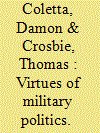

|
|
|
|
|
| Summary/Abstract |
Sociologists and political scientists have long fretted over the dangers that a politicized military poses to democracy. In recent times, however, civil–military relations experts in the United States accepted retired or indeed still serving generals and admirals in high-ranking political posts. Despite customary revulsion from scholars, the sudden waivers are an indicator that military participation in momentous national security decisions is inherently political without necessarily being partisan, including when civilian authority defers to a largely autonomous sphere for objective military expertise. Military politics is actually critical for healthy civil–military collaboration, when done prudently and moderately. Janowitz and Huntington, founders of the modern study of civil–military relations, understood the U.S. military’s inevitable invitation to political influence. Here, we elaborate on two neglected dimensions, implicit in their projects, of military politics under objective civilian control based on classical virtues of civic republicanism: Aristotle’s practical wisdom and Machiavelli’s virtú.
|
|
|
|
|
|
|
|
|
|
|
|
|
|
|
|
|
|
|
|
|